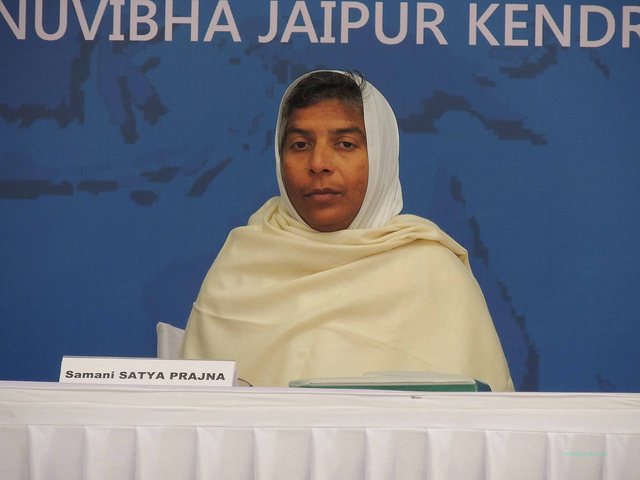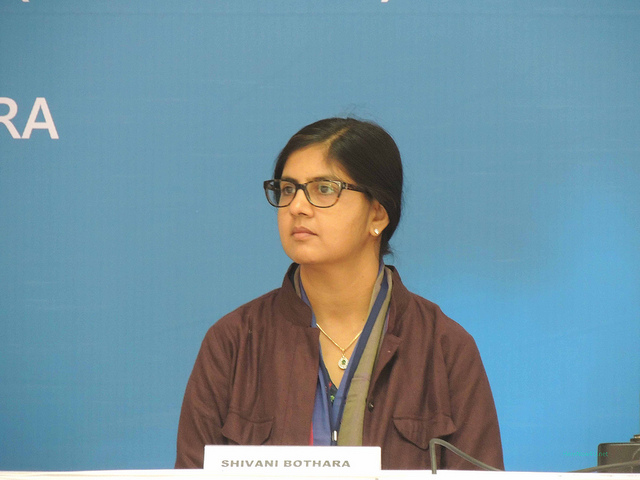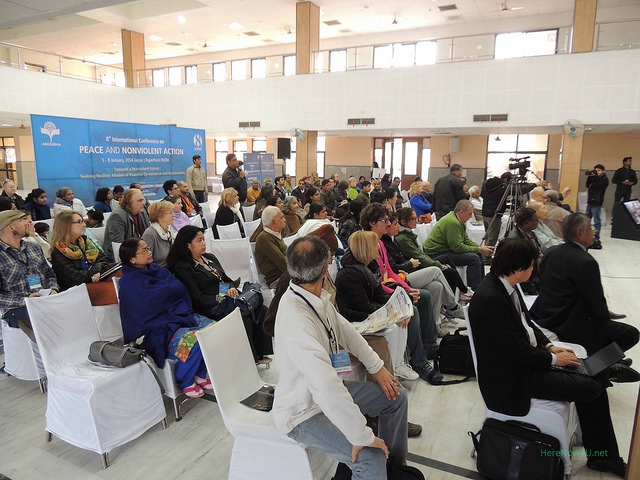An diesem Morgen des dritten Konferenztages hatte Dr. S.L. Gandhi den Vorsitz über die 1. Plenumssitzung an diesem Tag, die insgesamt 7. mit dem Thema „Anuvrat als Instrument des Wandels für eine bessere Welt“. Das Thema entsprach Dr. Gandhi als jahrelangem Anuvibha Präsidenten und gern gesehenem Vortragsredner zum Thema Anuvrat, und die vier Rednerinnen präsentierten ihre Aspekte des Anuvratgedankens wie das Fazit einer Arbeitsgruppe, obwohl jede für sich ihre Gedanken zum Thema erarbeitet hatte.
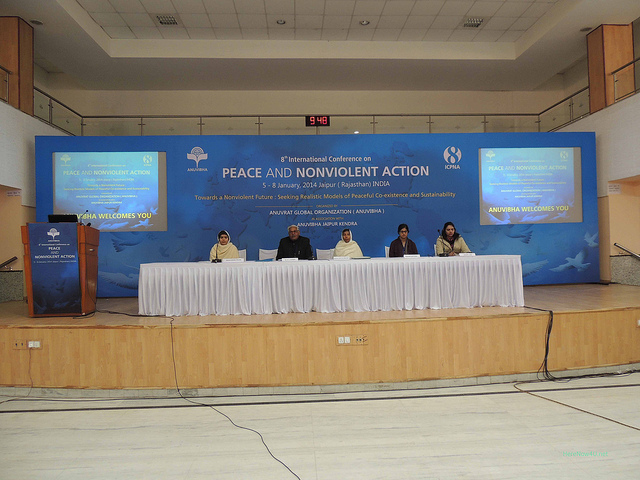
Dr. S.L. Gandhi hatte den Vorsitz über die 7. Plenumssitzung mit Beiträgen vo Samani Rohini Pragya (v.l.), Samani Satya Pragya, Shivani Bothra, Prof. Bharti Jain.
Samani Rohini Pragya beschrieb Anuvrat als empirisch-realistische Grenzüberschreitung der traditionellen Jaina Philosophie zu einer zeitgemäßen und praxisgerechten Spiritualität, ohne dazu einer bestimmten Glaubensgemeinschaft oder Metaphorik folgen zu müssen.
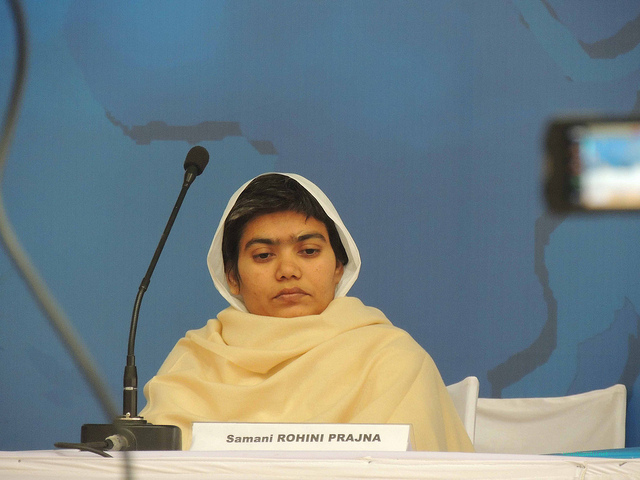
Samani Rohini Pragya auf dem Podium
Samani Satya Pragya stellte der Vielfalt von philosophischen Annahmen für eine bessere Welt die Lehren Mahaviras von den großen (Mahavratas) und kleinen Gelübden (Anuvratas) gegenüber, mit denen sich eine auf Respekt, Toleranz und Friedfertigkeit fußende Gesellschaft für jedes Individuum leicht in die Tat umsetzten lässt.
Shivani Bothra reflektierte darüber, ob sich Anuvrat künftig mit seiner universalen Konzeption weltweit über den Jainismus hinaus so ausdehnen kann, wie Yoga über Hinduismus und Meditation über Buddhismus.
Prof. Bharti Jain reflektierte in ihrem Vortrag besonders die Lage junger Frauen in Indien und erweiterte die kleinen Gelübde um die Variante, mindestens einmal täglich eine junge Frau in ihrem Bemühen um Aus- und Weiterbildung zu unterstützen. Dabei dachte ich unwillkürlich an die beiden Lehrerinnen vom Vortag und an die Aussage des Begründers von Anuvrat, der 9. Terapanth Acharya Tulsi, der sich stets für die Aus- und Weiterbildung junger Frauen eingesetzt hatte mit der Begründung, dass die Ausbildung eines Mannes diesem ermögliche, seinen Lebensunterhalt zu verdienen, die Ausbildung einer Frau zur Kultur einer ganzen Familie beitrage.
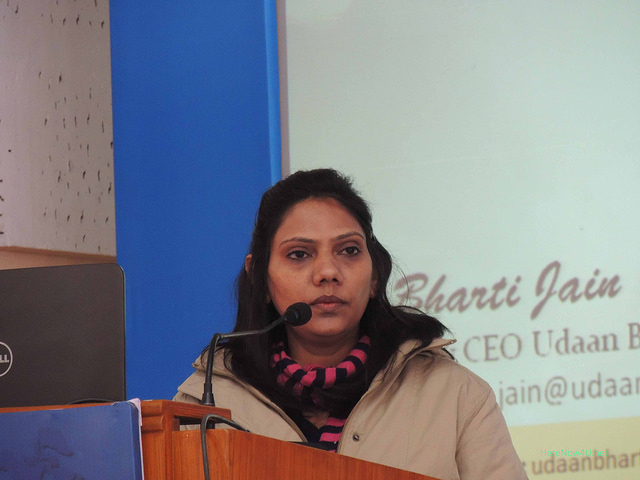
Prof. Bharti Jain während ihres Vortrages
Nach der Plenumssitzung ergab sich die Gelegenheit, mit den Samanis etwas ausführlicher zu sprechen. Samani Rohini Pragya und Samani Satya Pragya kenne ich seit 2007, als sie an meinem Deutschkurs an der JVBU Ladnun teilnahmen. Seitdem erfreuen sie mich mit einer Begrüßung auf Deutsch, „Guten Tag, wie geht es Ihnen, mir geht es gut.“ Wir sprachen über dies und das, bis Samani Rohini Pragya erwähnte, dass sie die englischen Untertitel für die 50 Videos von Acharya Tulsis Vorträgen fertig hätten und wir diese in HN4U veröffentlichen können. Allerdings hätten sie die Videos in Ladnun, wohin sie am selben Abend zurückkehren würden, während wir in dem Bus nach Bhinasar sitzen würden. Diese Fahrt führte nur leider nicht über Ladnun. So ergab sich das Problem, wie wir zu den Videos kämen, um sie online zu stellen. Dazu musste noch eine externe Festplatte besorgt werden als Speichermedium, denn auf diese zusätzlichen Datenmengen waren wir technisch nicht vorbereitet. Doch mit den „Saints“, bzw. ihrer Unterstützung werden die Lösungen für auftauchende Schwierigkeiten gleich mitgeliefert. Unsere spätere Gastgeberin Shivani wusste nicht nur, wo man am besten in Jaipur eine adäquate externe Festplatte findet, sondern begleitete Christian Geerdes auch dorthin. Sie mussten nicht weit gehen, lag der Computershop doch schräg gegenüber vom Anuvibha Bhawan. Gewusst, wo! Es war Nachmittag geworden, als die Samanis die Festplatte in Empfang nehmen konnten. Sie versprachen, dafür zu sorgen, dass die Videos auf die Festplatte kopiert würden und sie dann jemandem nach Jaipur für uns mitzugeben. Da wir jedoch auch später am Abend wegfahren würden, war noch die Übergabe an uns zu organisieren. Die Samanis beruhigten uns lächelnd mit der Bemerkung, dass schon alles klappen würde. Was auch so war. Als wir am nächsten Abend wieder in Jaipur eintrafen, klopfte es an unserer Tür, und jemand übergab uns die Festplatte mit den Videos. Später sahen wir dann nach einer Titel-Recherche im Internet, dass die Videos bereits online waren. Darauf kamen wir, weil die Samanis uns gesagt hatten, dass auch andere Interessenten von ihnen Kopien erhalten hätten. Doch auf diese Weise ist für alle Fälle auch bei uns eine Kopie der 50 Vorträge (Link zur englischen Version mit den Videos der Vorträge), man weiß ja nie.
Doch zurück zur Konferenz. Wie man sieht, sind die meisten ziemlich warm angezogen. Kein Wunder, war es doch nachts ziemlich kalt und die Häuser haben keine Heizung. So zog jeder an, was der Koffer nur hergab.
Auch die nächste Plenumssitzung hatte sehr interessante Vorträge dazu, wie das Heranführen junger Menschen an eine Kultur der Abkehr von der Gewalt dazu beitragen kann, eine Welt ohne Gewalt zu schaffen. Besonders die Ausführungen von Dr. Fons Delnoz über den effektiven Umgang mit Emotionen zeigten sehr praktikable Wege auf.
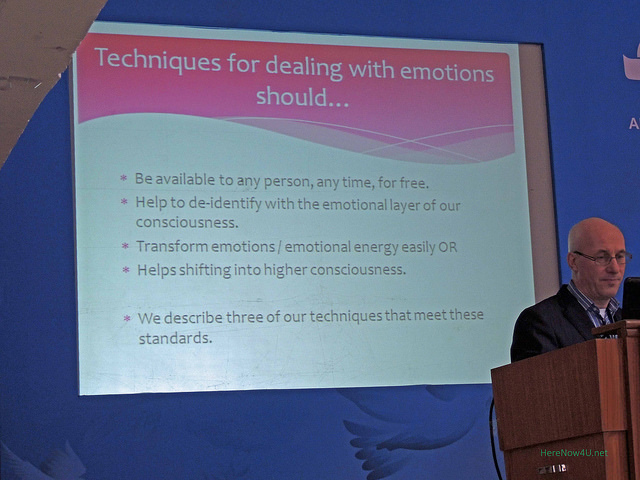
Dr. Fons Delnoz während seines Vortrages
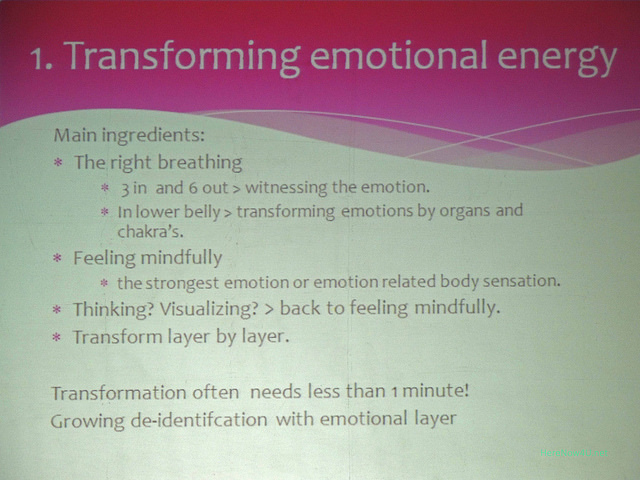
Wie man emotionale Energie transformieren kann
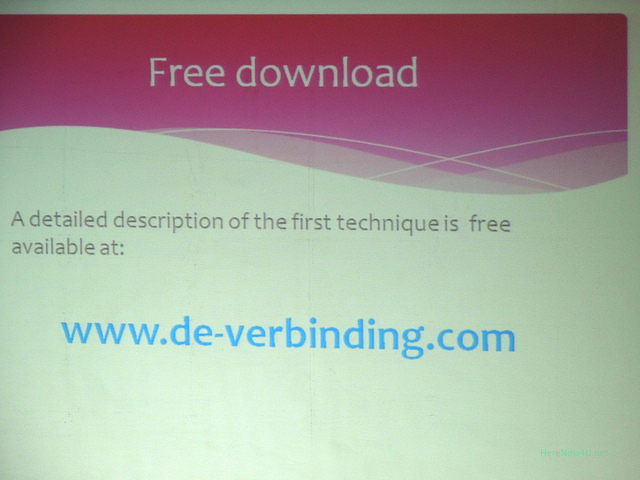
Link zu detaillierten Angaben über die angesprochenen Techniken
Dr. Delnoz vermittelte einfache, aber sehr wirkungsvolle Techniken wie Regulierung des Atems in Situationen emotionaler Erregung. Das hilft einem dabei zu beobachten, welche Gedanken die emotionalen Energien hervorbringen können, ohne diese auch gleich im Zustand der Erregung zu äußern. Diese Technik ist sehr hilfreich im Alltag, jeder kennt Situationen, in denen man sich nicht daran gehalten hat und das Ergebnis später bedauert. In diesem Zusammenhang erklärte er auch das seinen Techniken zugrunde liegende Prinzip emotionaler Schichten, die immer weiter in einem wirken, wenn sie nicht angebaut werden durch Bewusstmachung. Die in der Vergangenheit als Schichten abgelagerten emotionalen Energien werden nach und nach durch die Aufmerksamkeit abgebaut, die man auf sie konzentriert. Durch das Abtragen dieser Schichten kann man sich von ihnen allmählich befreien und einen neuen Blick auf das eigene Leben und die in ihm vorkommenden Menschen und Situationen gewinnen. Dazu gab er einen Link zu detaillierten Beschreibungen dieser Techniken.
Nachmittag und Abend vergingen wie im Fluge, und beim Abendessen wurde Abschied von den Teilnehmern genommen, die nicht mit nach Bhinasar fuhren. Alle packten noch ein paar Sachen für die Fahrt, und gegen 23:00h verließ der Bus Jaipur. Nach einiger Zeit wurde es immer ruhiger, die meisten waren eingeschlafen und erwachten erst, als der Bus anhielt.
PROGRAMME: TUESDAY, 7th January, 2014
06.30 Hrs - 07.30 Hrs. | OkiDo Yoga and Preksha Meditation by Mr. Pradeep Bhati (India) |
|
09.30 Hrs - 11.00 Hrs | SEVENTH PLENARY SESSION | M.S. (Main Hall) |
THEME: | Anuvrat as an Instrument of Change for a Better World |
CHAIR: | Dr. S.L. Gandhi (India) |
SPEAKERS: |
|
11.00 Hrs - 11.30 Hrs | TEA BREAK |
|
11.30 Hrs - 13.00 Hrs | EIGHTH PLENARY SESSION | M. S. (Main Hall) |
THEME: | Educating Youths in a Culture of Nonviolence for Creating a World without Violence |
CHAIR: | Rev. Doboom Tulku (Tibet) |
SPEAKERS: |
|
13.00 Hrs - 14.30 Hrs | LUNCH |
|
14.30 Hrs - 16.00 Hrs | NINETH PLENARY SESSION |
|
THEME: | Nonviolence and Possibilities of a Weaponless World |
CHAIR: | Padambhushan Shri D.R. Mehta (India) |
SPEAKERS: |
|
16.00 Hrs - 16.30 Hrs | TEA BREAK |
|
16.30 Hrs - 18.00 Hrs | WORKSHOPS |
|
Workshop-7 : Presenters: | Subject : Sustainability by Design
Subject: The Karate-Do & martial arts as a way of balance, overcoming fear and aggressiveness, how to evolve these into a way of peace
| Lecture Room 1 |
Workshop-8: | Subject : Dealing with Emotions
Subject: Rebuilding Lives: Bringing Peace
| Lecture Room 2 |
Workshop-9 : | Subject : Preparing Teachers and Workers for Peace for a Nonviolent World
Subject: OkiDo Yoga for Global Health (Meiso-Shiatsu)
| Lecture Room 3 |
| 19.00 Hrs - 20.00 Hrs | Dinner | |
| 22.00 Hrs | Departure for Bhinasar (Bikaner) by bus |
Details:
Pradeep Bharti | |
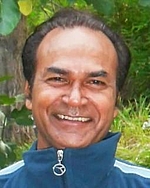 | Yoga Teacher and former teacher of Jain Vishwa Bharti University Ladnun in Science of Living, he travels around the world for Yoga and Preksha Meditation workshops. He is the 1st Meiso-Shiatsu therapist in India, head of OkiDo India in Jaipur and visiting professor of OkiDo Mikkyo Yoga Libera Universita in Italy. He was awarded by the former president of India for social activities. He holds a Master's Degree in Holistic Health from The Intercultural Open University. |
| Morning Workshop: | OkiDo Yoga and Preksha Meditation |
| |
Dr. Samani Rohini Pragya | |
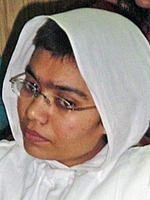 | Dr. Samani Rohini Pragya, Assistent Professor at the Dept. of Non-violence at Jain Vishva Bharati University (JVBU), teaching there since 2004 attended more that 30 national and international conferences, published more than 10 research articles, and is currently working on the project of Acharya Mahaprajna on structural violence. This involves study and editing Acharya Tulsi’s video lectures relayed on the Sanskar channel every Sunday including an English version since 2 years. Fifty-two episodes have been completed so far. |
Presentation: | Anuvrat: A Pragmatic Philosophy |
The philosophical foundation of Jainism is based on the notion that the soul is immortal, that there is rebirth, and that the soul migrates as per one’s deeds (karmas), and finally that the soul can attain emancipation from the cycles of existence and suffering. They are so framed that they produce strong conviction in reality. The present paper attempts to establish the fact that the Anuvrat doctrine as enunciated by H.H. Acharya Tulsi is like breaking the boundaries. It sets Anuvrat on a more realistic platform. This is to say that Anuvrat follows an empirical-realistic approach. Anuvrat in fact, truly establishes Jainism as a pragmatic school of thought. This is because, it does not pre-suppose any of the metaphysical assumptions as traditionally accepted in philosophical discourses. | |
| Dr. Samani Satya Pragya | |
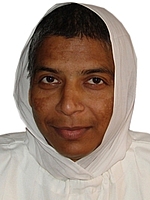 | Dr. Samani Satya Pragya, Associate Professor at the Dept. of Non-violence at Jain Vishva Bharati University (JVBU) and teaching there since 1994 attended more that 30 national and international conferences, published more than 10 research articles, and is currently working on the project of Acharya Mahaprajna on structural violence. This involves study and editing Acharya Tulsi’s video lectures relayed on the Sanskar channel every Sunday including an English version since 2 years. Fifty-two episodes have been completed so far. |
Presentation: | Impact of Anuvrat on Society |
Multi–dimensionality is the magnificence of the world. Lord Mahavir explained nonviolent and peaceful lifestyle in two terms- Mahavrat and Anuvrat. Acharya Tulsi enhanced it a little and made it more contemporary. The Anuvrat movement’s impact has no boundary. It brought revolutionary changes in every corner and dimension of the society. For instance in religion, in social practices, life styles, rituals and much more. Anuvrat – a new religious concept – was approachable by every common man who trusts in spirituality and morality. Human dignity in respect of equal right and economic benefits through moral and ethical ways are always respected. Anuvrat norms give a model of exploitation free society that consists of the following steps:
Thus, a society that is free from exploitation will take lead in self-restraint. There will be no place for uncontrollable mindset, the attraction towards hoarding and possessiveness, the centralization of wealth and power, and the dignity of wealth, violence and strength of power. Such a society will foster peace forever. | |
Shivani Bothra | |
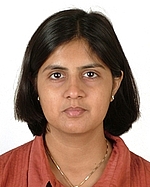 | Program coordinator of various experiential education programs, she has recently graduated from the Florida International University with MA in Religious Studies. Her Master’s thesis was descriptive and an analytical study of the Anuvrat Movement. Currently she is working towards her doctoral studies. |
Presentation: | Anuvrat: A Cradle of Change Towards a Nonviolent Society |
"Self-restraint is life", this three-worded slogan formed the philosophical ideal behind the Anuvrat Movement. The movement’s advocate, the late Acharya Tulsi, conceived of a set of vows as a practical form of spirituality and one of the plausible solutions towards a nonviolent society. This lecture will examine the first five Anuvrats or ‘small vows,’ which concern several aspects of violence prevalent in any society today. Furthermore, this lecture attempts to establish Anuvrat as synonymous to spirituality. Here, spirituality in the sense as yoga is without Hinduism or meditation is understood without Buddhism. Yoga and meditation are increasingly accepted as beneficial to holistic health, similarly can Anuvrat without Jainism complete this trinity for a healthy society? | |
| Bharti Jain, Prof. | |
 | Science graduate with MA (Eng.), DOEACC ‘A’ Level, M.Sc-CS and a motivational speaker, author of computer books for BCA and PGDCA, IT Project Manager with 14+ years of experience in Business Development, Quality Assurance and also a very renowned corporate trainer, now running a motivational site: udaanbharti.com. She also conducts workshops on Self Inspiration, Self Motivation, Women Empowerment and Team Building etc. |
| Presentation: | Rebuilding Lives: Bringing Peace |
Prof. Bharti Jain would like to introduce her work and her steps towards youth, women, society and nation. She introduces “Udaanbharti” (Inspire Yourself), an initiative, which is established in the year 2012 to groom professionals, who are actually in the process of building their careers and recognizing their inner strengths. Here she intends to launch “Udaanbharti” to a bigger platform and also work on issues like women empowerment, child care etc. This apart, my larger vision is to empower and illuminate lives and to make each and every section of the civil society to come forward and participate in this venture of building a new healthy society. She will present strategies to help overcome limiting beliefs, empowering to cope with challenges, helping to overcome fear, self doubt, and find oneself equipped with requisite skills to handle work independently, in group settings such as family, friends, even at work, and also to make the decisions that will lead to a balanced and peaceful live. | |
| Fons Delnooz, Alphonse, Dr. | |
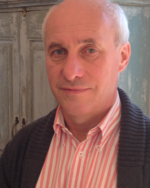 | Born 1957, he runs a private psychotherapeutic practice in the Netherlands together with his wife, Patricia Martinot. They give sessions, trainings and courses in Dutch, English and German. They work with children and adults individually and couples. A major issue in their work is the integration of spiritual concepts and techniques in the field of helping people in their development. They are specialized in working with high sensitive people. By Skype, they give sessions worldwide. They have published 10 books on their work, partially translated in German, Spanish and English. |
| Presentation: | |
Emotions are a part of human life. Sometimes people are identified with their emotions: they are their emotions; they think and act out of these emotions. This can have a (very) negative effect on the people they live with. Other people suppress their emotions, which in the end can lead to psycho-somatic diseases. For a world to be harmonious, people need to know ways to deal with their emotions so that they do not have to suppress them, nor act them out on others. In the past decade we have developed a series of techniques that has proven to be very effective. These techniques combine insights of East and West. In this lecture/workshop we would like to give a short oversight of the three techniques, and describe the first more in detail. For the participants there will be a free 15 page e-book available describing the first technique in detail. | |
| Susan Seats, Ms. | |
 | Susan is a teacher, social worker, peace advocate and public speaker. She has worked in the field of social work for over 35 years. Her creative approaches (especially with children) include interactive, creative techniques such as music, art, games, discussions and magic. Susan's appreciation of cultures has inspired her to travel internationally. Her nine trips to India involved helping with education projects in India’s rural schools through the organizations Rotary and Asha. She presently teaches people from many countries basic English conversation skills. Susan has a Bachelor Degree in Liberal Arts from the University of Illinois and a Master Degree in Rehabilitation from the University of Arizona. She enjoys travel, magic, piano, hiking, dancing, and meeting people from many different countries. |
| Presentation: | |
Raising a child with a Holistic type model is essential to encourage the spiritual, emotional and mental growth of a child. It is not enough to focus heavily only on academic success. The important building blocks important in raising a peaceful child are the following;
At the center is a circle of the child’s consciousness whereby awareness, acceptance of self and the inner strength of resilience takes form. | |
| Healing Ourselves; Healing the World: Youth Cultural Exchange as a Vehicle for Peace | |
It is easy to be discouraged when one sees the unrest all over the world, yet true peace begins with the individual. Through songs, discussions and lecture this workshop will explore the concept of Gandhi's powerful words "Be the Change". It will offer some suggestions and tools for "peacemakers" to "walk our talk", during these challenging times. Drawing from the wisdom of some current spiritual teachers and other sources of insight, we will look at how developing an attitude of gratitude for every experience and cultivating a practice of self-acceptance, while embracing our humanness, is essential for us to better help others shift from survival to a world of hope. | |
| |
| Monowara Begum Moni, Mrs. | |
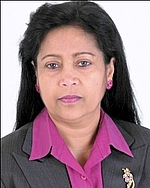 | Born in Dhaka, Bangladesh, 1958. Her profession is Journalism and Media Research, and she is Visiting Lecturer of Daffodil University, Press Institute, Democracy Watch, Bangladesh. Her studies include Bengali Literature and Linguistics, Economics and Pali (MA) from Dhaka University, Bangladesh 1981; and she is Holder of a Diploma in Journalism, University Hohenheim, Stuttgart, Germany 2002; she also studied Commercial Business, in Stuttgart, Germany, 2009. In 1989 she received the Prize: Best Journalist of the Year 1989, from Bangladesh Diploma Engineers Association. Publications: In Quest of a Golden Dream Dhaka, Bangladesh 1989, Mass Media in Bangladesh and its Press Freedom, Munich, Germany 2006; She published various research papers in Bangla Desh and Gernany. Member of DJV-BW (German Journalist Union). |
| Presentation: | World Without Weapons: A way towards Peaceful Life |
The purpose of this paper is to discuss and find out the problems of Nuclear Weapons. For millennia weapons have played crucial roles in society, molding and changing the course of history. They have destroyed civilizations and created new ones. When, for example, ancient Egypt was at its peak, the Hyksos invaded it only because they had superior weapons made of iron. There are many such examples in history. The United States was the first country to develop nuclear weapons and the only country to have used them. President Obama put the icing on the cake when he declared on April 4, 2009 that he shares the vision of a Nuclear Weapons-free World. NATO replied: Enact your vision for a World without Nuclear Weapons. Secretary General of the UN, Ban Ki-Moon has stated with great clarity: “A world free of nuclear weapons would be a global public good of the highest order.” I will discuss why this lucrative and mighty business is going to be switched off. Is it believable? Because “Wars of the Future” might be decided through manipulation of people's minds. A world without war can be seen as a long-range goal and plan for the peaceful future. | |
| Mano Mettanando Laohavanich | |
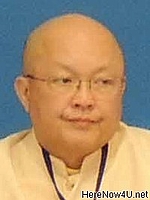 | Right now Mano is working on moral empowerment of the citizens through Buddhist Ethics and Abraham Maslow’s Hierarchy of Needs through the use of a smart ID card. It is an active project initiated and piloted by him through the Senate of Thailand. |
| Patricia Cecilia Martinot, Mrs. | |
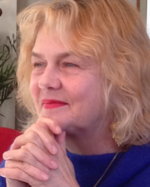 | Mrs. Patricia Martinot (1955) runs a private psychotherapeutic practice in the Netherlands together with her husband, Fons Delnooz. They give sessions, trainings and courses in Dutch, English and German. They work with children, adults individually and couples. A major issue in their work is the integration of spiritual concepts and techniques in the field of helping people in their development. They are specialized in working with high sensitive people. By Skype, they give sessions worldwide. They have published 10 books on their work, partially translated in German, Spanish and English. |
Workshop: | Dealing with Emotions |
| |
Sanjay Goyal, Shri | |
| Workshop: | Preparing Teachers and Workers for Peace: for a Nonviolent World |
“The well-being of mankind, its peace and security, are unattainable unless and until its unity is firmly established.” - Bahá’u’lláh Today the world is facing the daunting danger of the extinction of humankind. The atmosphere of disbelief, disrespect and religious intolerance among different ethnic groups and nations is visible everywhere. The whole world has become a place of competition for weapons where every other nation wants to invent more advanced weapons in spite of common goods and comforts for their citizens. The gap between developed, developing and underdeveloped nations is increasing constantly. Poverty, unemployment creates brutal clashes between different communities. In present time youth is conditioned and inspired by T.V. and cinema’s violent scenes that motivate them to do so. The prevailing conditions show the need for peace and cultural education for individuals in general and students in particular in Indian society. The students should be given ethical, spiritual, and peace training for their all-round development. We, in such a situation, need teachers and workers for peace to spread the message of brotherhood, tolerance, and oneness. The teachers should be trained in such a way that they can prepare students backed up with spiritual, emotional and Indian values and can help in creating harmonious atmosphere in society in its aftermath. The paper, thus, evaluates the present status of peace in society and its role for making the society nonviolent and a better place to live in. |
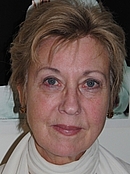 Carla Geerdes
Carla Geerdes
